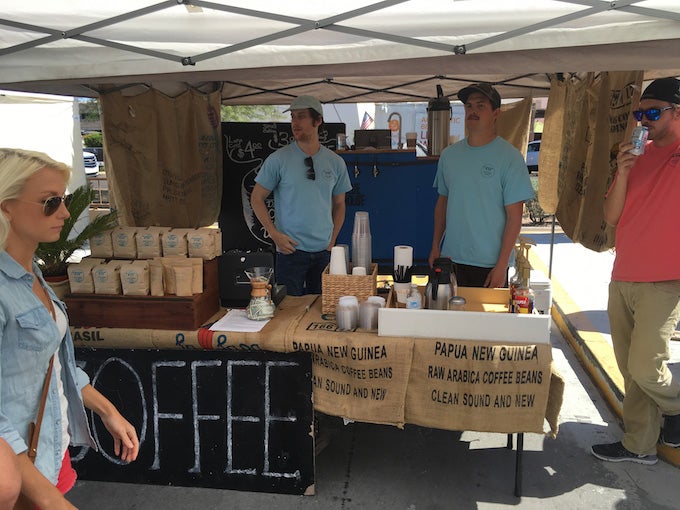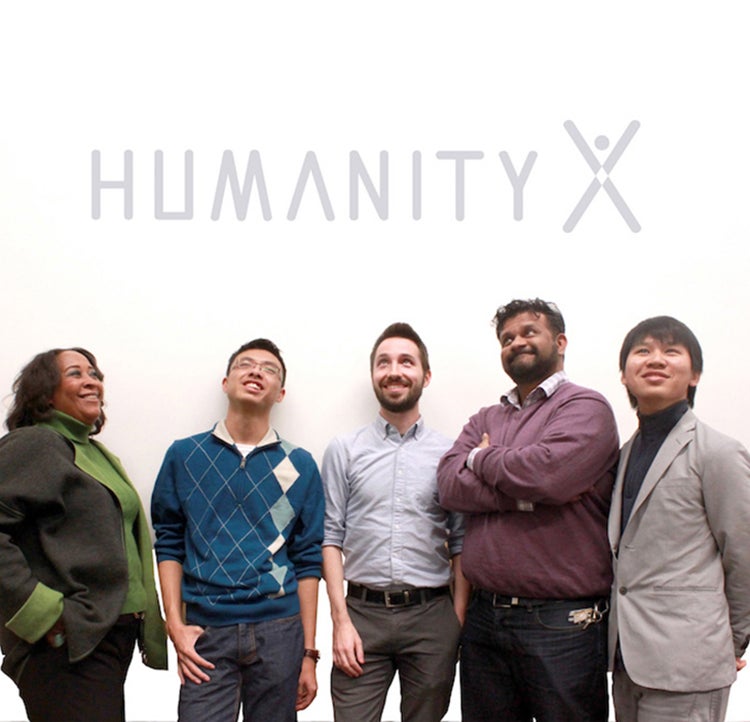When Sam Beger and Zack Zeigler first applied to an entrepreneurship competition a couple of years ago, things didn’t quite go as planned. Their concept was a mobile app to rent out parking spots. The idea was great, but they lacked the expertise to make it a reality.
“There is a huge emphasis on starting something in the tech industry or making an app,” Beger said. “But none of us had computer coding experience or anything like that.”
Meanwhile, they started another project for fun. It was based on a problem they were having themselves — the need for a good, simple, inexpensive cup of coffee near ASU’s Tempe campus. Along with their friend Nick DiPastena from Northern Arizona University, who had been give a coffee roaster as a gift, the group decided to start a business.
“This roaster essentially looked like a toaster oven that an engineer turned into a coffee roaster,” Beger said. It was old, but it worked. The group researched how to make cold brew, built a mobile coffee cart and set up their operation just off campus at the corner of College Avenue and University Drive. This was the start of Blue House Coffee, which is one of 20 new student ventures in the 2016 Edson Student Entrepreneurship Initiative cohort.
The Blue House Coffee crew poised for business at the Old Town Scottsdale Farmers' Market.
Edson is a student entrepreneurship program that focuses on economic, social, and educational impact. The initiative has supported more than 260 student teams and more than 1,000 students in the past 10 years. Student ventures selected as part of the Edson program receive up to $20,000 in seed funding, office space, mentoring, and up to 12 months of acceleration and support services — a highly responsive, individualized and student-centered environment that makes the program one of the most competitive and rewarding student entrepreneurship programs in the country.
The mission of the Edson program is to take students' ideas and grow them into viable businesses. This year’s cohort includes ventures in education technology, big data, wearable tech, e-commerce, health technology, social media and more.
Blue House Coffee might seem like an odd fit for the tech-heavy startup world. But Zeigler and Beger say they’ve already seen their idea evolve significantly from when they started with one old bike cart. The company’s mission is to enjoy great coffee, in great places, with great people. That means their operation is entirely mobile. The cart travels to areas where people already are, with the goal of enhancing their experience at that place. This is a departure from the typical coffee shop where customers often come to sit alone on their laptops.
“Coffee gets people buzzed, but we want it to be about more than that, too,” Zeigler said. “It’s about building their experience, or encouraging them to have a new routine and buy local.”
Blue House Coffee has expanded to the Old Town Scottsdale Farmers' Market. This new location brought nearly 20 times the number of customers Beger and Zeigler were used to.
“For three months it was just a nightmare. There was a huge failure at least every day,” Zeigler said. But the experience forced them to become efficient. Once they adapted to the larger crowd, the farmers market became much more lucrative than their spot near campus. It also allows the group to connect with customers who share an interest in local, ethically produced food.
Currently, Blue House Coffee sources small batches of beans from all over the world. Beger says the Edson investment will allow them to buy beans in bigger quantities so that they can work directly with farmers, which is more aligned with their mission to support great places and great people.
“When you buy from the farmers down the street, you not only develop some good relationships with them, but you can also tell your customers they are supporting a good cause,” Zeigler said.
Blue House Coffee is selling a product, but their mission is centered around people and connections. Another Edson company, Humanity X Technologies, is also focused on the well-being of people, but takes a completely different approach.
In a time when lives are increasingly being lived online, our social-media presence says a lot about us. Facebook profiles might show preferred travel destinations. Instagram accounts could offer insight into favorite foods. Twitter might indicate political affiliations and personal views. People express themselves online every day. But what if their posts, tweets and captions painted a picture of someone who desperately needed help?
Humanity X Technologies is a technology platform to identify and help people in crisis on social media. The team, which includes Jordan Bates, Pat Pataranutaporn, Ram Polur, BinHong Lee and Kacie McCollum, met at a hackathon that was organized by Project Humanities called Hacks for Humanity. Some team members are students with backgrounds in computer science and biology. Others are community members. They brainstormed together at the hackathon and came up with the idea that day.
The Humanity X Technologies team.
To start out, the company is focusing on Twitter. They use a web program to connect to the programming interface of Twitter users and scan each message for keywords. These keywords are associated with suicidal thinking — for example, “I want to die,” “kill myself” and other similar phrases.
The program uses machine learning to download and scan the tweets. Then a counselor can review them through a separate interface, and after assigning a certain level of risk to each message, they can reach out to the person in crisis and offer help.
Humanity X Technologies plans to sell their product to universities so it can be used to help students. With the Edson investment, Bates says they will apply for a patent and cover the legal expenses of revising their operating agreement. The team is also looking forward to having the support of a mentor — something any new venture can benefit from. Zeigler and Berger of Blue House Coffee are eager to take advantage of the mentorship as well.
“We wanted to be part of a mentor group where everyone is in it together and you can have a sounding board,” Zeigler said. “It’s a little bit easier to not know what you’re doing when you have someone behind you who wants you to succeed.”
The 2016 Edson Cohort includes 20 new ventures: BeeSprout, BetR-blok, Billy Bars, BISTEG, Blue House Coffee, Bot + BotScripts, Buzzly Media, Fusion Folder, Humanity X Technologies, Hygiea, Knoze, Lagomm, MyDigital Backpack, Occupit, Speedy Castillo, The Distinguished Gentlemen's Club Inc., The Water Bearers, UnieHub, Zero2One Diagnostics, and Zingfo.
Learn more about some of the Edson Cohort here.
More Business and entrepreneurship
The business behind the brand
Ask Jennifer Boonlorn ('01 BS in marketing) about the secret to a successful career in the luxury fashion industry and she'll tell you that community building is top of the list."I want to share…

Thunderbird at ASU ranked No. 1 in QS International Trade Rankings for third consecutive year
For the third consecutive year, Thunderbird School of Global Management at Arizona State University has been recognized as the world leader in international trade, a distinction awarded by…

'Meating' dietary needs: Study sheds light on how rising prices affect meat consumption
When prices on certain food items go up — like eggs and meat — because of the rise in plant-based diets, consumers can find an alternative.But our diets are also culturally conditioned, so for some,…


